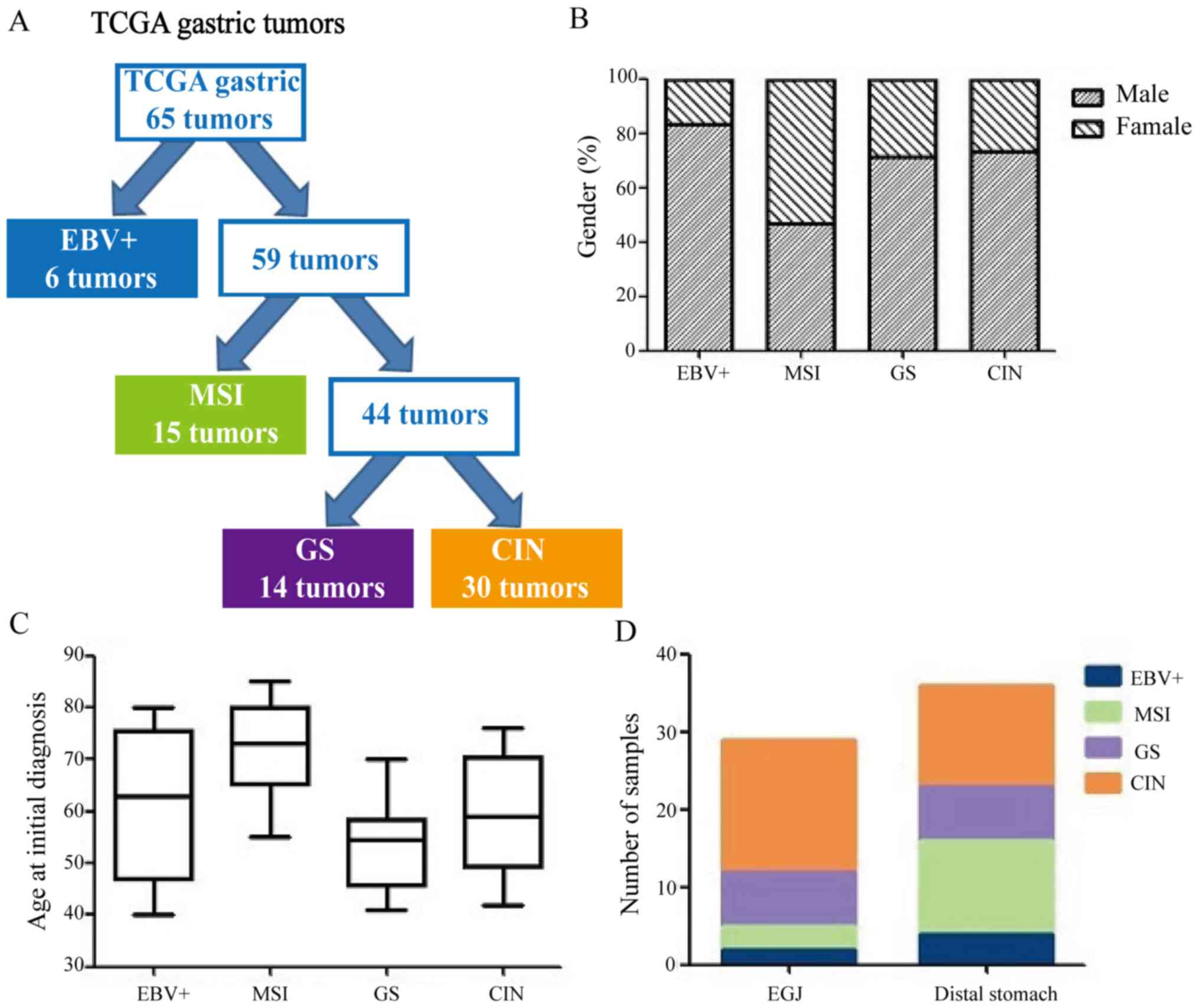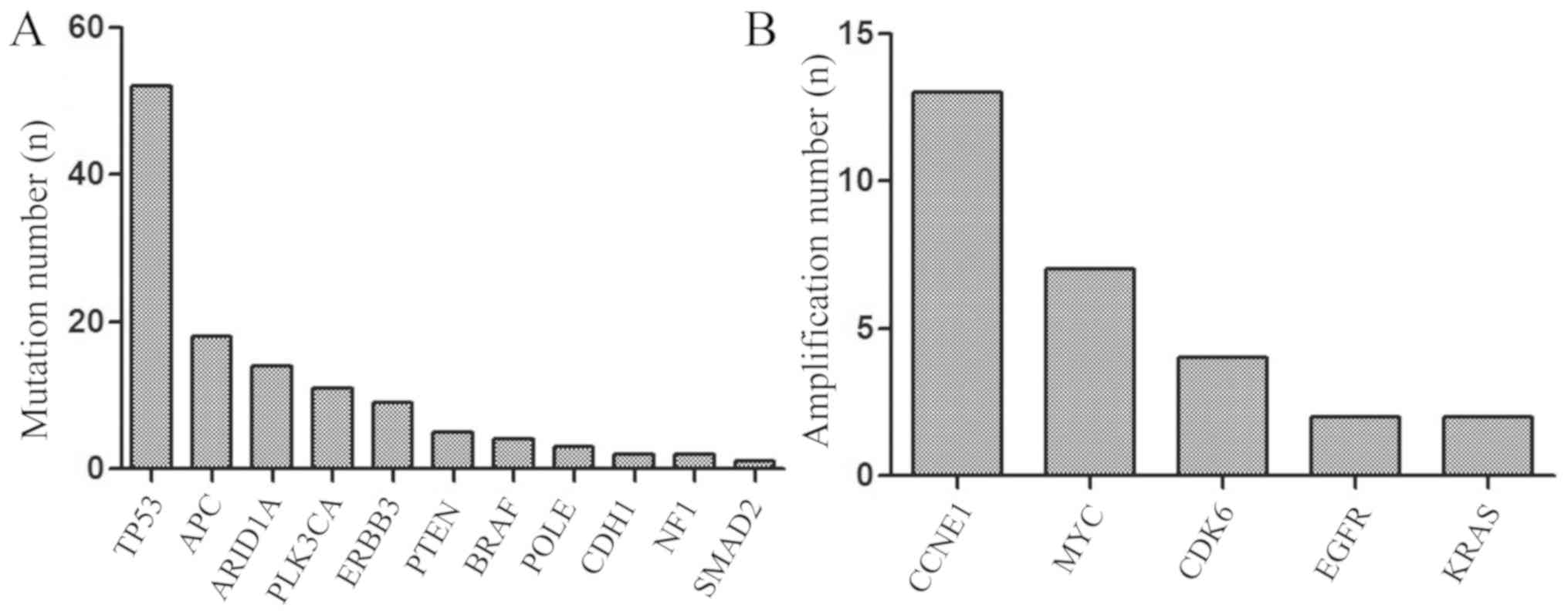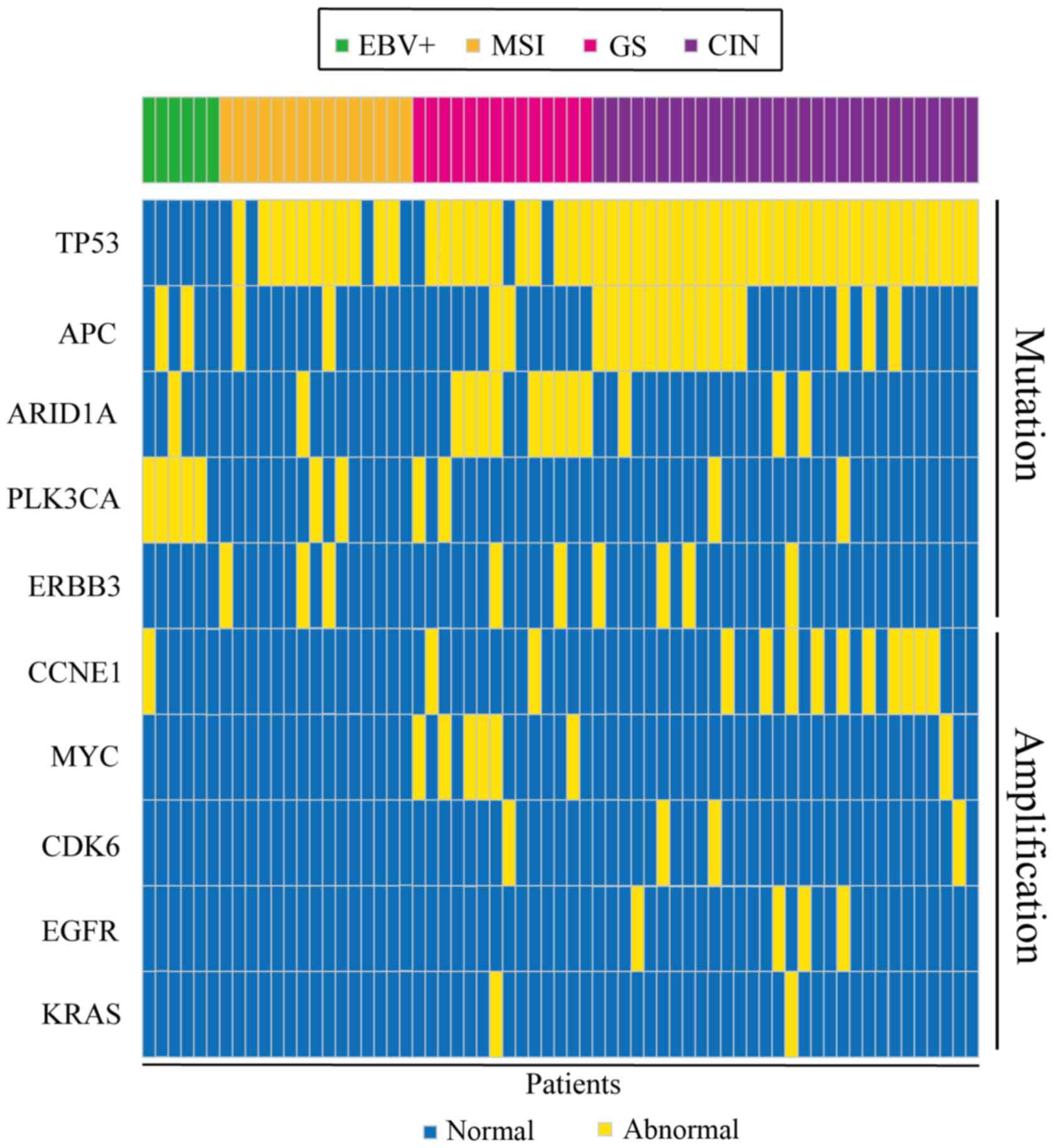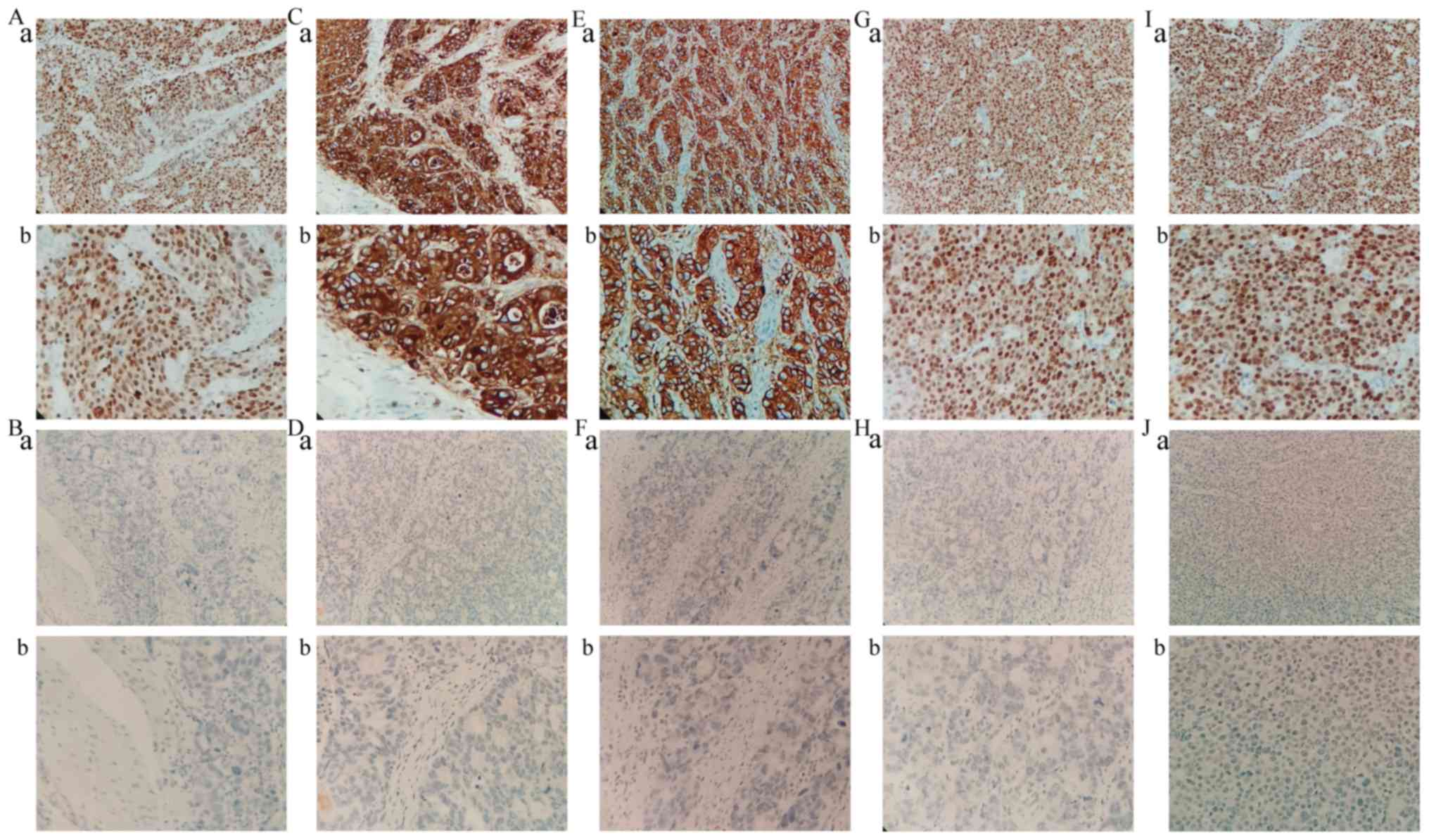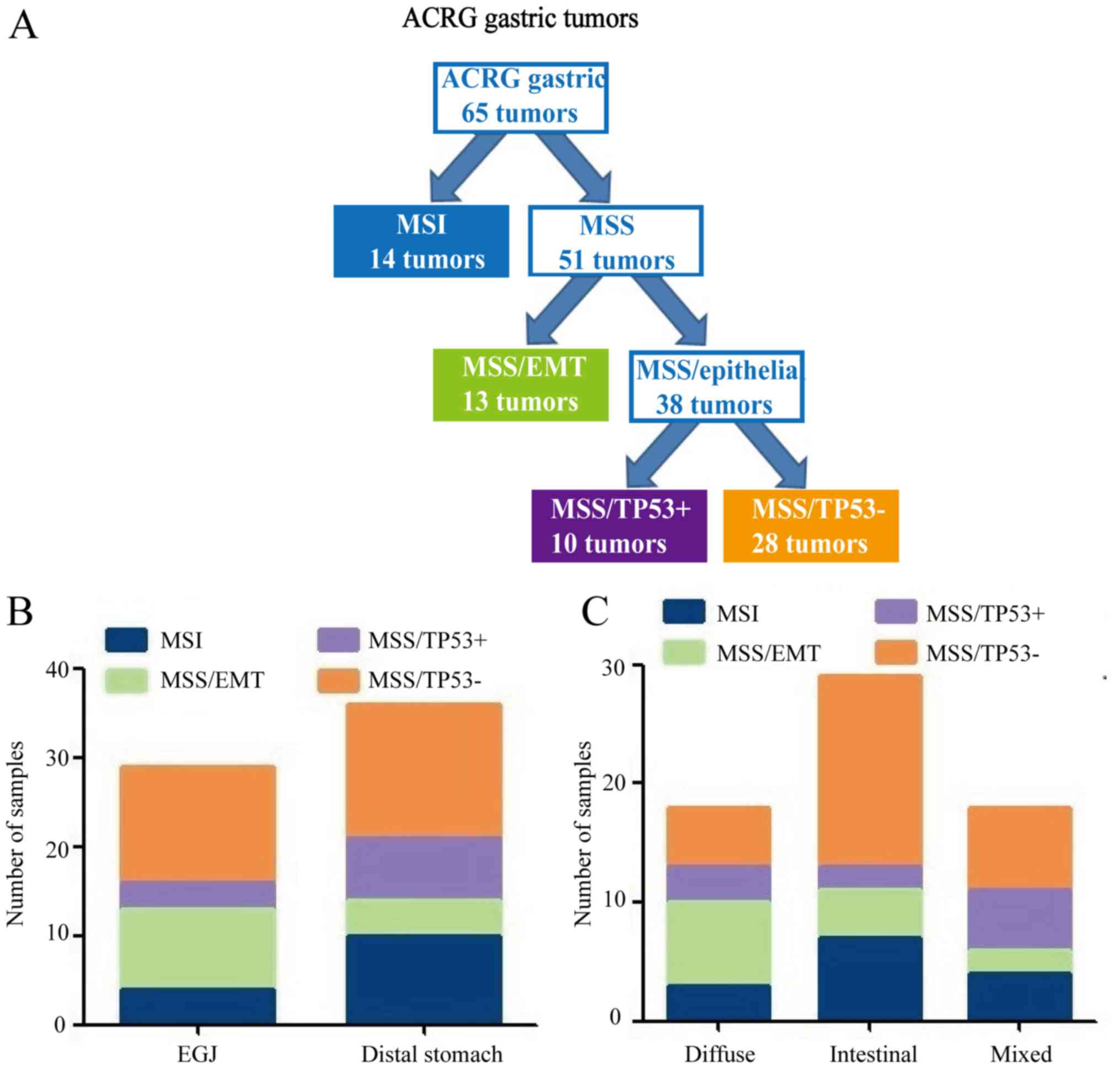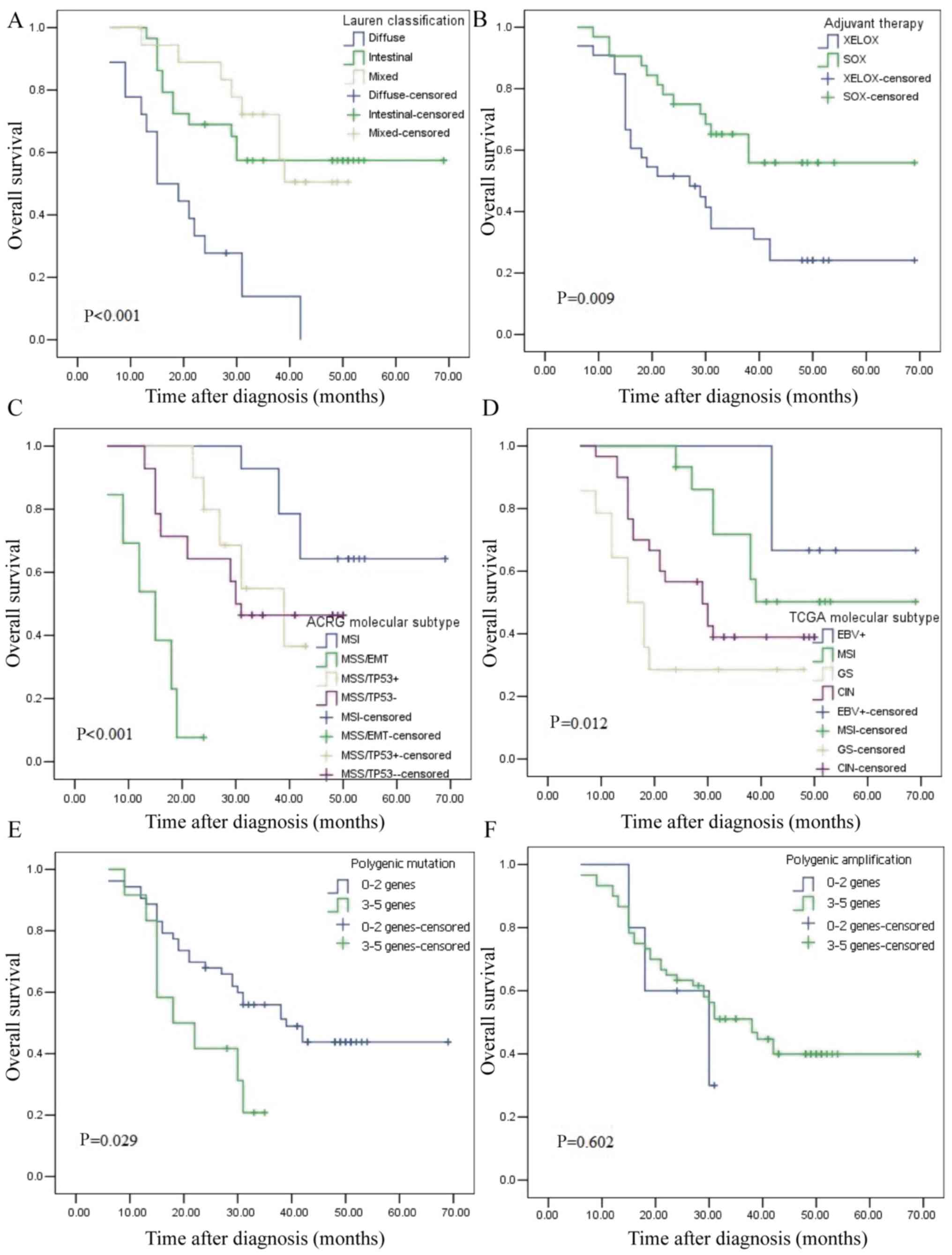|
1
|
Bray F, Ferlay J, Soerjomataram I, Siegel
RL, Torre LA and Jemal A: Global cancer statistics 2018: GLOBOCAN
estimates of incidence and mortality worldwide for 36 cancers in
185 countries. CA Cancer J Clin. 68:394–424. 2018. View Article : Google Scholar : PubMed/NCBI
|
|
2
|
Chen W, Zheng R, Baade PD, Zhang S, Zeng
H, Bray F, Jemal A, Yu XQ and He J: Cancer statistics in China,
2015. CA Cancer J Clin. 66:115–132. 2016. View Article : Google Scholar : PubMed/NCBI
|
|
3
|
Lee HS, Cho SB, Lee HE, Kim MA, Kim JH,
Park DJ, Kim JH, Yang HK, Lee BL and Kim WH: Protein expression
profiling and molecular classification of gastric cancer by the
tissue array method. Clin Cancer Res. 13:4154–4163. 2007.
View Article : Google Scholar : PubMed/NCBI
|
|
4
|
Shabani Azim F, Houri H, Ghalavand Z and
Nikmanesh B: Next generation sequencing in clinical oncology:
Applications, challenges and promises: A review article. Iran J
Public Health. 47:1453–1457. 2018.PubMed/NCBI
|
|
5
|
Cancer Genome Atlas Research Network, .
Comprehensive molecular characterization of gastric adenocarcinoma.
Nature. 513:202–209. 2014. View Article : Google Scholar : PubMed/NCBI
|
|
6
|
Cristescu R, Lee J, Nebozhyn M, Kim KM,
Ting JC, Wong SS, Liu J, Yue YG, Wang J, Yu K, et al: Molecular
analysis of gastric cancer identifies subtypes associated with
distinct clinical outcomes. Nat Med. 21:449–456. 2015. View Article : Google Scholar : PubMed/NCBI
|
|
7
|
Zou L, Wu Y, Ma K, Fan Y, Dong D, Geng N
and Li E: Molecular classification of esophagogastric junction
carcinoma correlated with prognosis. Onco Targets Ther.
10:4765–4772. 2017. View Article : Google Scholar : PubMed/NCBI
|
|
8
|
Robinson JT, Thorvaldsdóttir H, Wenger AM,
Zehir A and Mesirov JP: Variant Review with the integrative
genomics viewer. Cancer Res. 77:e31–e34. 2017. View Article : Google Scholar : PubMed/NCBI
|
|
9
|
Sinicrope FA, Ruan SB, Cleary KR, Stephens
LC, Lee JJ and Levin B: bcl-2 and p53 oncoprotein expression during
colorectal tumorigenesis. Cancer Res. 55:237–241. 1995.PubMed/NCBI
|
|
10
|
Thibodeau SN, French AJ, Roche PC,
Cunningham JM, Tester DJ, Lindor NM, Moslein G, Baker SM, Liskay
RM, Burgart LJ, et al: Altered expression of hMSH2 and hMLH1 in
tumors with microsatellite instability and genetic alterations in
mismatch repair genes. Cancer Res. 56:4836–4840. 1996.PubMed/NCBI
|
|
11
|
Thibodeau SN, French AJ, Cunningham JM,
Tester D, Burgart LJ, Roche PC, McDonnell SK, Schaid DJ, Vockley
CW, Michels VV, et al: Microsatellite instability in colorectal
cancer: Different mutator phenotypes and the principal involvement
of hMLH1. Cancer Res. 58:1713–1718. 1998.PubMed/NCBI
|
|
12
|
Kim SY, Park C, Kim HJ, Park J, Hwang J,
Kim JI, Choi MG, Kim S, Kim KM and Kang MS: Deregulation of immune
response genes in patients with Epstein-Barr virus-associated
gastric cancer and outcomes. Gastroenterology. 148:137–147.e9.
2015. View Article : Google Scholar : PubMed/NCBI
|
|
13
|
Martinez-Ciarpaglini C,
Fleitas-Kanonnikoff T, Gambardella V, Llorca M, Mongort C, Mengual
R, Nieto G, Navarro L, Huerta M, Rosello S, et al: Assessing
molecular subtypes of gastric cancer: Microsatellite unstable and
Epstein-Barr virus subtypes. Methods for detection and clinical and
pathological implications. ESMO Open. 4:e0004702019. View Article : Google Scholar : PubMed/NCBI
|
|
14
|
Velho S, Fernandes MS, Leite M, Figueiredo
C and Seruca R: Causes and consequences of microsatellite
instability in gastric carcinogenesis. World J Gastroenterol.
20:16433–16442. 2014. View Article : Google Scholar : PubMed/NCBI
|
|
15
|
Li X, Wu WK, Xing R, Wong SH, Liu Y, Fang
X, Zhang Y, Wang M, Wang J, Li L, et al: Distinct subtypes of
gastric cancer defined by molecular characterization include novel
mutational signatures with prognostic capability. Cancer Res.
76:1724–1732. 2016. View Article : Google Scholar : PubMed/NCBI
|
|
16
|
Ashizawa M, Saito M, Min AKT, Ujiie D,
Saito K, Sato T, Kikuchi T, Okayama H, Fujita S, Endo H, et al:
Prognostic role of ARID1A negative expression in gastric cancer.
Sci Rep. 9:67692019. View Article : Google Scholar : PubMed/NCBI
|
|
17
|
Hetmanski JHR, Schwartz JM and Caswell PT:
Rationalizing Rac1 and Rho AGTPase signaling: A mathematical
approach. Small GTPase. 9:224–229. 2018. View Article : Google Scholar
|
|
18
|
Lim B, Kim JH, Kim M and Kim SY: Genomic
and epigenomic heterogeneity in molecular subtypes of gastric
cancer. World J Gastroenterol. 22:1190–1201. 2016. View Article : Google Scholar : PubMed/NCBI
|
|
19
|
Birkman EM, Ålgars A, Lintunen M,
Ristamäki R, Sundström J and Carpén O: EGFR gene amplification is
relatively common and associates with outcome in intestinal
adenocarcinoma of the stomach, gastro-oesophageal junction and
distal oesophagus. BMC Cancer. 16:4062016. View Article : Google Scholar : PubMed/NCBI
|
|
20
|
Bria E, Pilotto S, Simbolo M, Fassan M, de
Manzoni G, Carbognin L, Sperduti I, Brunelli M, Cataldo I,
Tomezzoli A, et al: Comprehensive molecular portrait using next
generation sequencing of resected intestinal-type gastric cancer
patients dichotomized according to prognosis. Sci Rep. 6:229822016.
View Article : Google Scholar : PubMed/NCBI
|
|
21
|
Wang Q, Liu G and Hu C: Molecular
classification of gastric adenocarcinoma. Gastroenterology Res.
12:275–282. 2019. View Article : Google Scholar : PubMed/NCBI
|















